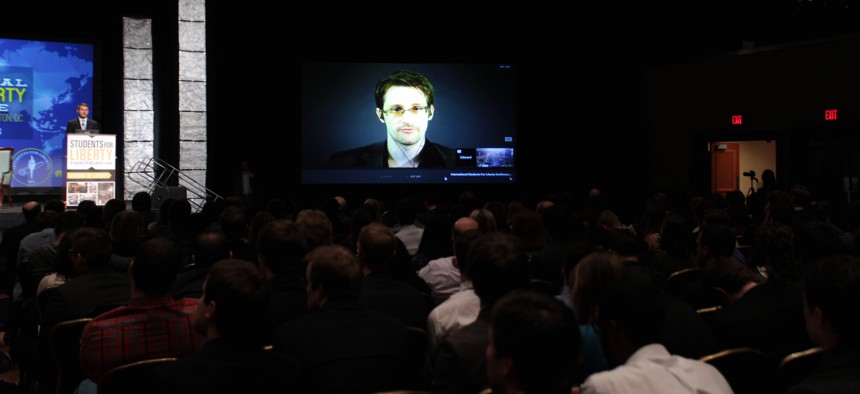
Edward Snowden spoke via videoconference with supporters at the 2015 International Students for Liberty Conference in DC in February. Flickr user Gage Skidmore
A New Ruling Against the NSA is a Win for Edward Snowden
The NSA has nevertheless filed for an emergency stay from a higher court.
A US federal judge ruled Nov. 9 against the National Security Agency for its bulk collection of phone call records, first disclosed by whistleblower Edward Snowden in 2013. It’s a largely symbolic win against the agency, but one still celebrated by Snowden and other opponents of mass surveillance.
Washington, DC district court judge Richard Leon granted an injunction to bar the National Security Agency (NSA) from collecting the phone call data of J.J. Little, a California attorney and conservative activist, along with data from his small legal practice.
In his ruling, Leon said it is “substantially likely” that the bulk collection program is “unlawful”—and furthermore, that Little and his law firm have “suffered a concrete harm” from of the collection and warehousing of their phone records.
Unlike previous rulings against the NSA, Leon’s ruling will go into effect immediately, as Newsweek points out, because Leon’s opinion does not grant a stay. The NSA has nevertheless filed for an emergency stay from a higher court.
Leon’s ruling is far from the wide-reaching win that privacy advocates may have hoped for, because it is so limited in its scope: it only applies to Little and his law firm. It also comes a bit late, just a few weeks before the NSA is scheduled to end this program, as mandated by Congress, and put a new one with more restrictions in place.
Snowden, in any case, applauded the ruling on Twitter, calling it a “historic decision.”
In historic decision, US Court finds @NSAGov spying violated Americans' rights. Victory! https://t.co/OtBGc3aVuU pic.twitter.com/7thZIGXbyI
— Edward Snowden (@Snowden) November 9, 2015(Image via Flickr user Gage Skidmore)






